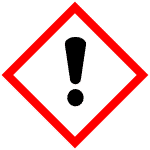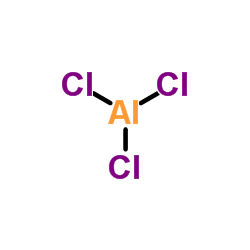氟化钆(III), 无水, 粉末, 99.9% metals basis,Gadolinium(III) fluoride
产品编号:西域试剂-WR362333| CAS NO:13765-26-9| MDL NO:MFCD00016113| 分子式:GdF3| 分子量:214.25
本网站销售的所有产品仅用于工业应用或者科学研究等非医疗目的,不可用于人类或动物的临床诊断或者治疗,非药用,非食用,
| 产品名称 | 氟化钆(III), 无水, 粉末, 99.9% metals basis |
|---|---|
| 英文名称 | Gadolinium(III) fluoride |
| CAS编号 | 13765-26-9 |
| 产品熔点 | 1231°C |
| 产品沸点 | 19.5ºC at 760 mmHg |
| 产品密度 | 7.1 |
| 精确质量 | 101.95100 |
| LogP | 1.26060 |
| 外观性状 | 白色结晶固体 |
| 稳定性 | 常温常压下稳定 避免的物料 酸 。不溶于冷水,微溶于热的氢氟酸中。 |
| 储存条件 | 常温密闭,阴凉通风干燥 |
相关文档
化学品安全说明书(MSDS)
下载MSDS质检证书(COA)
相关产品
| 符号 |

GHS07 |
|---|---|
| 信号词 | Warning |
| 危害声明 | H315-H319-H335 |
| 警示性声明 | P305 + P351 + P338 |
| 个人防护装备 | dust mask type N95 (US);Eyeshields;Gloves |
| 危害码 (欧洲) | Xi: Irritant; |
| 风险声明 (欧洲) | R36/37/38 |
| 安全声明 (欧洲) | S26-S36 |
| 危险品运输编码 | UN 3288 6.1/PG 3 |
| WGK德国 | 3 |
| 包装等级 | III |
| 危险类别 | 6.1 |
|
Section 1: Product Identification Chemical Name:Gadolinium (III) fluoride, anhydrous (99.9%-Gd) (REO) CAS Registry Number:13765-26-9 Formula:GdF3 EINECS Number:237-369-4 Chemical Family:metal halide Synonym:Gadolinium trifluoride
Section 2: Composition and Information on Ingredients IngredientCAS NumberPercentACGIH (TWA)OSHA (PEL) Title Compound13765-26-9100%2.5mg/m3 (as F)2.5mg/m3 (as F) Section 3: Hazards Identification Emergency Overview:Irritating to the respiratory tract, skin and eyes. May be harmful if swallowed. Primary Routes of Exposure:Contact with skin and eyes. Inhalation of dust. Eye Contact:Causes irritation of the eyes. Skin Contact:Causes slight to mild irritation of the skin. Inhalation:Irritating to skin, eyes and respiratory tract. Toxicity reduced to the extent that this compound is relatively insoluble. In large amounts may cause vomiting, Ingestion: abdominal pain and diarrhea. Irritating to skin, eyes and respiratory tract. Fluoride poisoning may cause nausea, vomiting, diarrhea, Acute Health Affects: weakness, coma, and respiratory paralysis. Chronic Health Affects:Prolonged exposure to hydrolysable fluorine compounds can cause deterioration of bone and tooth structure. NTP:No IARC:No OSHA:No SECTION 4: First Aid Measures Immediately flush the eyes with copious amounts of water for at least 10-15 minutes. A victim may need Eye Exposure: assistance in keeping their eye lids open. Get immediate medical attention. Wash the affected area with water. Remove contaminated clothes if necessary. Apply calcium gluconate jelly Skin Exposure: or water soluble calcium salts as antidote. Seek medical assistance. Remove the victim to fresh air. Closely monitor the victim for signs of respiratory problems, such as difficulty Inhalation: in breathing, coughing, wheezing, or pain. In such cases seek immediate medical assistance. Seek medical attention immediately. Keep the victim calm. Give the victim water (only if conscious). Induce Ingestion: vomiting only if directed by medical personnel. SECTION 5: Fire Fighting Measures Flash Point:not applicable Autoignition Temperature:none Explosion Limits:none Extinguishing Medium:None. Material is non-flammable. Special Fire Fighting Procedures:No special fire fighting procedures required. Hazardous Combustion andnone Decomposion Products: Unusual Fire or Explosion Hazards: No unusual fire or explosion hazards. SECTION 6: Accidental Release Measures Spill and Leak Procedures:Small spills can be mixed with powdered sodium bicarbonate, lime, or calcium carbonate and swept up. SECTION 7: Handling and Storage Handling and Storage:Store solid in a tightly sealed container. SECTION 8: Exposure Controls and Personal Protection Eye Protection:Always wear approved safety glasses when handling a chemical substance in the laboratory. Skin Protection:Wear protective clothing and gloves. Consult with glove manufacturer to determine the proper type of glove. Ventilation:Material may form a fine dust. If possible, handle the material in an efficient fume hood. If in form of fine dust and ventilation is not available a respirator should be worn. The use of respirators Respirator: requires a Respirator Protection Program to be in compliance with 29 CFR 1910.134. Ventilation:Material may form a fine dust. If possible, handle the material in an efficient fume hood. Additional Protection:No additional protection required. SECTION 9: Physical and Chemical Properties Color and Form:white pwdr. Molecular Weight:214.25 Melting Point:no data Boiling Point:no data Vapor Pressure:no data Specific Gravity:no data Odor:none Solubility in Water:insoluble SECTION 10: Stability and Reactivity Stability:air and moisture stable Hazardous Polymerization:no hazardous polymerization Conditions to Avoid:none Incompatibility:none Decomposition Products:none SECTION 11: Toxicological Information RTECS Data:No information available in the RTECS files. Carcinogenic Effects:no data Mutagenic Effects:no data Tetratogenic Effects:no data SECTION 12: Ecological Information Ecological Information:No information available SECTION 13: Disposal Considerations Disposal:Dispose of according to local, state and federal regulations. SECTION 14: Transportation Shipping Name (CFR):Non-hazardous Hazard Class (CFR):NA Additional Hazard Class (CFR):NA Packaging Group (CFR):NA UN ID Number (CFR):NA Shipping Name (IATA):Non-hazardous Hazard Class (IATA):NA Additional Hazard Class (IATA):NA Packaging Group (IATA):NA UN ID Number (IATA):NA SECTION 15: Regulatory Information TSCA:Listed in the TSCA inventory. SARA (Title 313):Title compound not listed. Second Ingredient:none SECTION 16 - ADDITIONAL INFORMATION N/A |
|
~% 
13765-26-9 |
| 文献:Gmelin Handbook: Sc: MVol.C3, 6.2.2.1.3, page 35 - 36 Full Text Show Details Th. Goldschmidt A.-G. Patent: DE1169907 , 1964 ; C. A., 1964 , vol. 61, p. 3965 |
|
~% 
13765-26-9 |
| 文献:Zhurnal Neorganicheskoi Khimii, , vol. 12, p. 449 - 450 Zhurnal Neorganicheskoi Khimii, , vol. 12, p. 851 - 856 Sc: MVol.C3, 6.2.2.1.10, page 39 - 39 |
| 上游产品 3 | |
|---|---|
| 下游产品 0 | |












 浙公网安备 33010802013016号
浙公网安备 33010802013016号